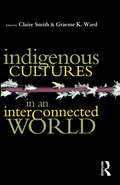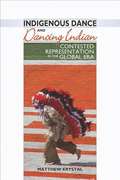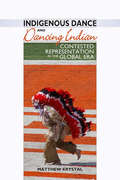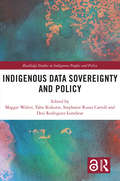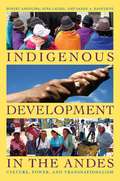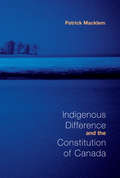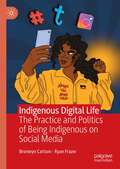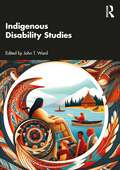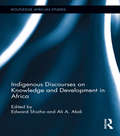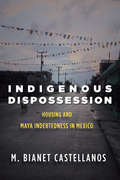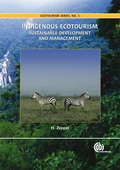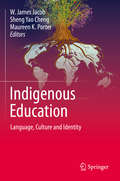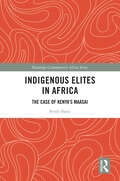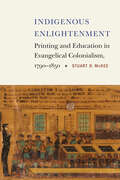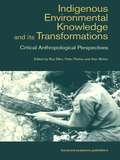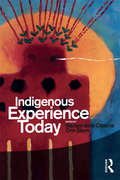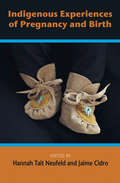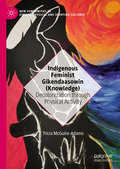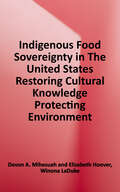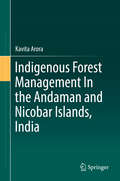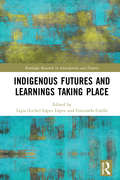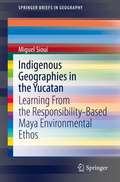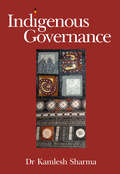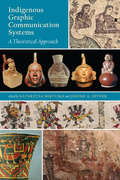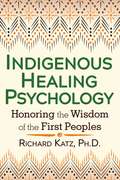- Table View
- List View
Indigenous Cultures in an Interconnected World
by Claire SmithIncreasingly, Indigenous people are being drawn into global networks. In the long term, cultural isolation is unlikely to be a viable even if sometimes desired option, so how can Indigenous people protect and advance their cultural values in the face of pressures from an interconnected world?Indigenous Cultures in an Interconnected World is a comprehensive, thought provoking discussion of the challenges that globalisation brings to Indigenous peoples. It discusses successful strategies that have been used by Indigenous peoples to promote their identities and cultural values. It looks at their roles as equal and active participants and, indeed, as innovators and leaders in an interconnected world.The chapters in this book present a global perspective on Indigenous issues. They feature a cross-disciplinary integration that takes a holistic approach in-line with that of most Indigenous peoples and include vignettes of Indigenous cultural practices.
Indigenous Dance and Dancing Indian
by Matthew KrystalFocusing on the enactment of identity in dance, Indigenous Dance and Dancing Indian is a cross-cultural, cross-ethnic, and cross-national comparison of indigenous dance practices. Considering four genres of dance in which indigenous people are represented--K'iche Maya traditional dance, powwow, folkloric dance, and dancing sports mascots--the book addresses both the ideational and behavioral dimensions of identity. Each dance is examined as a unique cultural expression in individual chapters, and then all are compared in the conclusion, where striking parallels and important divergences are revealed. Ultimately, Krystal describes how dancers and audiences work to construct and consume satisfying and meaningful identities through dance by either challenging social inequality or reinforcing the present social order. Detailed ethnographic work, thorough case studies, and an insightful narrative voice make Indigenous Dance and Dancing Indian a substantial addition to scholarly literature on dance in the Americas. It will be of interest to scholars of Native American studies, social sciences, and performing arts.
Indigenous Dance and Dancing Indian: Contested Representation in the Global Era
by Matthew KrystalFocusing on the enactment of identity in dance, Indigenous Dance and Dancing Indian is a cross-cultural, cross-ethnic, and cross-national comparison of indigenous dance practices. Considering four genres of dance in which indigenous people are represented--K'iche Maya traditional dance, powwow, folkloric dance, and dancing sports mascots--the book addresses both the ideational and behavioral dimensions of identity. Each dance is examined as a unique cultural expression in individual chapters, and then all are compared in the conclusion, where striking parallels and important divergences are revealed. Ultimately, Krystal describes how dancers and audiences work to construct and consume satisfying and meaningful identities through dance by either challenging social inequality or reinforcing the present social order. Detailed ethnographic work, thorough case studies, and an insightful narrative voice make Indigenous Dance and Dancing Indian a substantial addition to scholarly literature on dance in the Americas. It will be of interest to scholars of Native American studies, social sciences, and performing arts.
Indigenous Data Sovereignty and Policy (Routledge Studies in Indigenous Peoples and Policy)
by Maggie Walter, Tahu Kukutai, Stephanie Russo Carroll and Desi Rodriguez-LonebearThis book examines how Indigenous Peoples around the world are demanding greater data sovereignty, and challenging the ways in which governments have historically used Indigenous data to develop policies and programs. In the digital age, governments are increasingly dependent on data and data analytics to inform their policies and decision-making. However, Indigenous Peoples have often been the unwilling targets of policy interventions and have had little say over the collection, use and application of data about them, their lands and cultures. At the heart of Indigenous Peoples’ demands for change are the enduring aspirations of self-determination over their institutions, resources, knowledge and information systems. With contributors from Australia, Aotearoa New Zealand, North and South America and Europe, this book offers a rich account of the potential for Indigenous data sovereignty to support human flourishing and to protect against the ever-growing threats of data-related risks and harms.
Indigenous Development in the Andes: Culture, Power, and Transnationalism
by Robert Andolina Nina Laurie Sarah A. RadcliffeAs indigenous peoples in Latin America have achieved greater prominence and power, international agencies have attempted to incorporate the agendas of indigenous movements into development policymaking and project implementation. Transnational networks and policies centered on ethnically aware development paradigms have emerged with the goal of supporting indigenous cultures while enabling indigenous peoples to access the ostensible benefits of economic globalization and institutionalized participation. Focused on Bolivia and Ecuador, Indigenous Development in the Andes is a nuanced examination of the complexities involved in designing and executing "culturally appropriate" development agendas. Robert Andolina, Nina Laurie, and Sarah A. Radcliffe illuminate a web of relations among indigenous villagers, social movement leaders, government officials, NGO workers, and staff of multilateral agencies such as the World Bank. The authors argue that this reconfiguration of development policy and practice permits Ecuadorian and Bolivian indigenous groups to renegotiate their relationship to development as subjects who contribute and participate. Yet it also recasts indigenous peoples and their cultures as objects of intervention and largely fails to address fundamental concerns of indigenous movements, including racism, national inequalities, and international dependencies. Andean indigenous peoples are less marginalized, but they face ongoing dilemmas of identity and agency as their fields of action cross national boundaries and overlap with powerful institutions. Focusing on the encounters of indigenous peoples with international development as they negotiate issues related to land, water, professionalization, and gender, Indigenous Development in the Andes offers a comprehensive analysis of the diverse consequences of neoliberal development, and it underscores crucial questions about globalization, governance, cultural identity, and social movements.
Indigenous Difference and the Constitution of Canada
by Patrick MacklemThere is a unique constitutional relationship between Aboriginal people and the Canadian state - a relationship that does not exist between other Canadians and the state. It's from this central premise that Patrick Macklem builds his argument in this outstanding and significant work.Why does this special relationship exist? What does it entail in terms of Canadian constitutional order? There are, Macklem argues, four complex social facts that lie at the heart of the relationship. First, Aboriginal people belong to distinctive cultures that were and continue to be threatened by non-Aboriginal beliefs, philosophies, and ways of life. Second, prior to European contact, Aboriginal people lived in and occupied North America. Third, prior to European contact, Aboriginal people not only occupied North America; they exercised sovereign authority over persons and territory. Fourth, Aboriginal people participated in and continue to participate in a treaty process with the Crown. Together, these four social conditions are exclusive to the Aboriginal people of North America and constitute what Macklem refers to as indigenous difference.Exploring the constitutional significance of indigenous difference in light of the challenges it poses to the ideal of equal citizenship, Macklem engages an interdisciplinary methodology that treats constitutional law as an enterprise that actively distributes power, primarily in the form of rights and jurisdiction, among a variety of legal actors, including individuals, groups, institutions, and governments. On this account, constitutional law refers to an ongoing project of aspiring to distributive justice, disciplined but not determined by text, structure, or precedent. Far from threatening equality, constitutional protection of indigenous difference promotes equal and therefore just distributions of constitutional power.The book details constitutional rights to Aboriginal people that protect interests associated with culture, territory, sovereignty, and the treaty process, and explores the circumstances in which these rights can be interfered with by the Canadian state. It also examines the relation between these rights and the Canadian Charter of Rights and Feedoms, and proposes extensive reform of existing treaty processes in order to protect and promote their exercise.Macklem's book offers a challenge to traditional understandings of the constitutional status of indigenous peoples, relevant not only to Canadian debates but also to those in other parts of the world where indigenous peoples are asserting greater autonomy over their collective futures.
Indigenous Digital Life: The Practice and Politics of Being Indigenous on Social Media
by Bronwyn Carlson Ryan FrazerSettler societies habitually frame Indigenous people as ‘a people of the past’—their culture somehow ‘frozen’ in time, their identities tied to static notions of ‘authenticity’, and their communities understood as ‘in decline’. But this narrative erases the many ways that Indigenous people are actively engaged in future-orientated practice, including through new technologies. Indigenous Digital Life offers a broad, wide-ranging account of how social media has become embedded in the lives of Indigenous Australians. Centring on ten core themes—including identity, community, hate, desire and death—we seek to understand both the practice and broader politics of being Indigenous on social media. Rather than reproducing settler narratives of Indigenous ‘deficiency’, we approach Indigenous social media as a space of Indigenous action, production, and creativity; we see Indigenous social media users as powerful agents, who interact with and shape their immediate worlds with skill, flair and nous; and instead of being ‘a people of the past’, we show that Indigenous digital life is often future-orientated, working towards building better relations, communities and worlds. This book offers new ideas, insights and provocations for both students and scholars of Indigenous studies, media and communication studies, and cultural studies.
Indigenous Disability Studies
by John T. WardThis book provides a comprehensive approach to the perspectives, lived experiences, and socio-cultural beliefs of Indigenous scholars regarding disabilities through a distinctions-based approach. Indigenous people demonstrate considerable knowledge in a multitude of capacities in spite of legal, monetary, social, economic, health, and political inequalities that they experience within from administrative authorities whether health, education, or governments.By including various knowledge systems related to social-cultural, traditional governance, spirituality, educational, and self-representation within a communal understanding, the knowledge brought forth will be a combination of information from within/communal and outwards/infusion by Indigenous teachers, scholars, academics, and professionals who aim to combat the negative effects of disability labels and policies that have regulated Indigenous peoples.Comprised of five sections: The power, wisdom, knowledge, and lived experiences of Elders Reframing the narrative – Navigating self-representation Learning from within – Including traditional knowledge Challenging colonial authority – Infusing regional ideals and concepts Interpretations, narratives, and lived experiences of grassroots teachers and social service providers It will be an asset to those who seek out a deeper understanding of the complexity of Indigenous people and their knowledge, including anyone who deals with predominantly non-Indigenous mindsets and barriers to education.Courses on disability studies, Indigenous studies, social work, health, education, and development studies will all benefit from this book.
Indigenous Discourses on Knowledge and Development in Africa (Routledge African Studies #14)
by Ali A. Abdi Edward ShizhaAfrican social development is often explained from outsider perspectives that are mainly European and Euro-American, leaving African indigenous discourses and ways of knowing and doing absent from discussions and debates on knowledge and development. This book is intended to present Africanist indigenous voices in current debates on economic, educational, political and social development in Africa. The authors and contributors to the volume present bold and timely ideas and scholarship for defining Africa through its challenges, possible policy formations, planning and implementation at the local, regional, and national levels. The book also reveals insightful examinations of the hype, the myths and the realities of many topics of concern with respect to dominant development discourses, and challenges the misconceptions and misrepresentations of indigenous perspectives on knowledge productions and overall social well-being or lack thereof. The volume brings together researchers who are concerned with comparative education, international development, and African development, research and practice in particular. Policy makers, institutional planners, education specialists, governmental and non-governmental managers and the wider public should all benefit from the contents and analyses of this book.
Indigenous Dispossession: Housing and Maya Indebtedness in Mexico
by M. Bianet CastellanosFollowing the recent global housing boom, tract housing development became a billion-dollar industry in Mexico. At the national level, neoliberal housing policy has overtaken debates around land reform. For Indigenous peoples, access to affordable housing remains crucial to alleviating poverty. But as palapas, traditional thatch and wood houses, are replaced by tract houses in the Yucatán Peninsula, Indigenous peoples' relationship to land, urbanism, and finance is similarly transformed, revealing a legacy of debt and dispossession. Indigenous Dispossession examines how Maya families grapple with the ramifications of neoliberal housing policies. M. Bianet Castellanos relates Maya migrants' experiences with housing and mortgage finance in Cancún, one of Mexico's fastest-growing cities. Their struggle to own homes reveals colonial and settler colonial structures that underpin the city's economy, built environment, and racial order. But even as Maya people contend with predatory lending practices and foreclosure, they cultivate strategies of resistance—from "waiting out" the state, to demanding Indigenous rights in urban centers. As Castellanos argues, it is through these maneuvers that Maya migrants forge a new vision of Indigenous urbanism.
Indigenous Ecotourism: Sustainable Development and Management
by Heather D. ZeppelDealing with indigenous ecotourism as a special type of nature-based tourism, Indigenous Ecotourism examines the key principles of this field through global case studies and analyzes the key factors for sustainable development.
Indigenous Education
by W. James Jacob Sheng Yao Cheng Maureen K. PorterIndigenous Education is a compilation of conceptual chapters and national case studies that includes empirical research based on a series of data collection methods. The book provides up-to-date scholarly research on global trends on three issues of paramount importance with indigenous education--language, culture, and identity. It also offers a strategic comparative and international education policy statement on recent shifts in indigenous education, and new approaches to explore, develop, and improve comparative education and policy research globally. Contributing authors examine several social justice issues related to indigenous education. In addition to case perspectives from 12 countries and global regions, the volume includes five conceptual chapters on topics that influence indigenous education, including policy debates, the media, the united nations, formal and informal education systems, and higher education.
Indigenous Elites in Africa: The Case of Kenya's Maasai (Routledge Contemporary Africa)
by Serah ShaniThis book investigates the formation, configuration and consolidation of elites amongst Kenya’s Maasai. The Maasai ethnic group is one of the world’s most anthropologized populations, but research tends to focus on what appears to be their dismal situation, analysing how their culture hinders or challenges modern ideas of economic and political development. This book instead focuses on the Maasai men and women who rise to the position of elites, overcoming the odds to take on positions as politicians, professors, CEOs, and high-end administrators. The twenty-first century has seen new opportunities for progression beyond the social reproduction of family wealth, with NGOs, missionaries, tourists and researchers providing new sources of global capital flows. The author, who is Maasai herself, demonstrates the diverse local, national, and global resources and opportunities which lead to social mobility and elite formation. The book also shows how female elites have been able to navigate a patriarchal society in their journey to attaining and maintaining elite status. This book will be of interest to researchers across the fields of anthropology, political science, international development, sociology, and African studies.
Indigenous Enlightenment: Printing and Education in Evangelical Colonialism, 1790–1850
by Stuart McKeeIn Indigenous Enlightenment Stuart D. McKee examines the methodologies, tools, and processes that British and American educators developed to inculcate Indigenous cultures of reading. Protestant expatriates who opened schools within British and U.S. colonial territories between 1790 and 1850 shared the conviction that a beneficent government should promote the enlightenment of its colonial subjects. It was the aim of evangelical enlightenment to improve Indigenous peoples&’ welfare through the processes of Christianization and civilization and to transform accepting individuals into virtuous citizens of the settler-colonial community. Many educators quickly discovered that their teaching efforts languished without the means to publish books in the Indigenous languages of their subject populations. While they could publish primers in English by shipping manuscripts to printers in London or Boston, books for Indigenous readers gained greater accuracy and influence when they stationed a printer within the colony. With a global perspective traversing Western colonial territories in the U.S.-Mexico borderlands, the South Pacific, Madagascar, India, and China, Indigenous Enlightenment illuminates the challenges that British and American educators faced while trying to coerce Indigenous children and adults to learn to read. Indigenous laborers commonly supported the tasks of editing, printing, and dissemination and, in fact, dominated the workforce at most colonial presses from the time printing began. Yet even in places where schools and presses were in synchronous operation, missionaries found that Indigenous peoples had their own intellectual systems, and most did not learn best with Western methods.
Indigenous Enviromental Knowledge and its Transformations: Critical Anthropological Perspectives (Studies in Environmental Anthropology #Vol. 5)
by Roy Ellen Alan Bicker Peter ParkesThe first concerted critical examination of the uses and abuses of indigenous knowledge. The contributors focus on a series of interrelated issues in their interrogation of indigenous knowledge and its specific applications within the localised contexts of particular Asian societies and regional cultures. In particular they explore the problems of translation and mistranslation in the local-global transference of traditional practices and representations of resources.
Indigenous Experience Today (Wenner-Gren International Symposium Series)
by Marisol De La CadenaA century ago, the idea of indigenous people as an active force in the contemporary world was unthinkable. It was assumed that native societies everywhere would be swept away by the forward march of the West and its own peculiar brand of progress and civilization. Nothing could be further from the truth. Indigenous social movements wield new power, and groups as diverse as Australian Aborigines, Ecuadorian Quichuas, and New Zealand Maoris, have found their own distinctive and assertive ways of living in the present world. Indigenous Experience Today draws together essays by prominent scholars in anthropology and other fields examining the varied face of indigenous politics in Bolivia, Botswana, Canada, Chile, China, Indonesia, and the United States, amongst others. The book challenges accepted notions of indigeneity as it examines the transnational dynamics of contemporary native culture and politics around the world.
Indigenous Experiences of Preguancy and Birth
by Neufield Hannah TaitTraditional midwifery, culture, customs, understandings, and meanings surrounding pregnancy and birth are grounded in distinct epistemologies and worldviews that have sustained Indigenous women and their families since time immemorial. Years of colonization, however, have impacted the degree to which women have choice in the place and ways they carry and deliver their babies. As nations such as Canada became colonized, traditional gender roles were seen as an impediment. The forced rearrangement of these gender roles was highly disruptive to family structures. Indigenous women quickly lost their social and legal status as being dependent on fathers and then husbands. The traditional structures of communities became replaced with colonially informed governance, which reinforced patriarchy and paternalism. The authors in this book carefully consider these historic interactions and their impacts on Indigenous women’s experiences. As the first section of the book describes, pregnancy is a time when women reflect on their bodies as a space for the development of life. Foods prepared and consumed, ceremony and other activities engaged in are no longer a focus solely for the mother, but also for the child she is carrying. Authors from a variety of places and perspectives thoughtfully express the historical along with contemporary forces positively and negatively impacting prenatal behaviours and traditional practices. Place and culture in relation to birth are explored in the second half of the book from locations in Canada such as Manitoba, Ontario, British Columbia, the Northwest Territories, and Aotearoa. The reclaiming and revitalization of birthing practices along with rejuvenating forms of traditional knowledge form the foundation for exploration into these experiences from a political perspective. It is an important part of decolonization to acknowledge policies such as birth evacuation as being grounded in systemic racism. The act of returning birth to communities and revitalizing Indigenous prenatal practices are affirmation of sustained resilience and strength, instead of a one-sided process of reconciliation.
Indigenous Feminist Gikendaasowin: Decolonization through Physical Activity (New Femininities in Digital, Physical and Sporting Cultures)
by Tricia McGuire-AdamsThis book presents knowledge from Indigenous women who enact decolonization and wellbeing through physical activity. In sport, physical activity, and health disciplines, there is a significant need for Indigenous women’s theoretical and methodological perspectives. While much research is published from a Western perspective on Indigenous peoples’ health, sport, and physical activity, less is known from Indigenous feminist and community perspectives. The chapters therefore inform the broader sociology of sport and Indigenous feminist fields on Indigenous cultural perspectives of physical activity.
Indigenous Food Sovereignty in the United States: Restoring Cultural Knowledge, Protecting Environments, and Regaining Health (New Directions In Native American Studies Ser.)
by Devon A. Mihesuah Elizabeth Hoover"All those interested in Indigenous food systems, sovereignty issues, or environment, and their path toward recovery should read this powerful book." -Kathie L. Beebe, American Indian Quarterly Centuries of colonization and other factors have disrupted indigenous communities' ability to control their own food systems. This volume explores the meaning and importance of food sovereignty for Native peoples in the United States, and asks whether and how it might be achieved and sustained. Unprecedented in its focus and scope, this collection addresses nearly every aspect of indigenous food sovereignty, from revitalizing ancestral gardens and traditional ways of hunting, gathering, and seed saving to the difficult realities of racism, treaty abrogation, tribal sociopolitical factionalism, and the entrenched beliefs that processed foods are superior to traditional tribal fare. The contributors include scholar-activists in the fields of ethnobotany, history, anthropology, nutrition, insect ecology, biology, marine environmentalism, and federal Indian law, as well as indigenous seed savers and keepers, cooks, farmers, spear fishers, and community activists. After identifying the challenges involved in revitalizing and maintaining traditional food systems, these writers offer advice and encouragement to those concerned about tribal health, environmental destruction, loss of species habitat, and governmental food control.
Indigenous Forest Management In the Andaman and Nicobar Islands, India
by Kavita AroraThis book offers an extensive study of indigenous communities in the Andaman and Nicobar Islands, India, and their methods of forest conservation, along with an exploration of the impact of forestry operations in the islands and the wide scale damage they have incurred on both the land and the people. Through an in-depth analysis of the contrasting indigenous practices and governmental forestry schemes, the author has compared the modern ‘Joint Forest Management’ resolution with the ethos and practices of the indigenous people of the Andaman and Nicobar Islands. Throughout the book, readers will learn about the different indigenous communities inhabiting these islands and the treasure of knowledge each of them provide on forest conservation. The book establishes that the notion of knowledge is politicized by the dominant culture in the context of Andaman’s forest tribes, and traces how this denial of the existence of indigenous knowledge by government officials has led to reduced forest area in the region. The book also explores and analyses strategies to utilize and conserve the tribes' profound knowledge of the biodiversity of the islands and study their efforts towards forest conservation, protection and rejuvenation.
Indigenous Futures and Learnings Taking Place (Routledge Research in Anticipation and Futures)
by Ligia López LópezSingularizing progressive time binds pasts, presents, and futures to cause-effect chains overdetermining existence in education and social life more broadly. Indigenous Futures and Learnings Taking Place disrupts the common sense of "futures" in education or "knowledge for the future" by examining the multiplicity of possible destinies in coexistent experiences of living and learning. Taking place is the intention this book has to embody and world multiplicity across the landscapes that sustain life. The book contends that Indigenous perspectives open spaces for new forms of sociality and relationships with knowledge, time, and landscapes. Through Goanna walking and caring for Country; conjuring encounters between forests, humans, and the more-than-human; dreams, dream literacies, and planes of existence; the spirit realm taking place; ancestral luchas; Musquem hən̓q̓əmin̓əm̓ Land pedagogies; and resoluteness and gratitude for atunhetsla/the spirit within, the chapters in the collection become politicocultural and (hi)storical statements challenging the singular order of the future towards multiple encounters of all that is to come. In doing so, Indigenous Futures and Learnings Taking Place offers various points of departure to (hi)story educational futures more responsive to the multiplicities of lives in what has not yet become. The contributors in this volume are Indigenous women, women of Indigenous backgrounds, Black, Red, and Brown women, and women whose scholarship is committed to Indigenous matters across spaces and times. Their work in the chapters often defies prescriptions of academic conventions, and at times occupies them to enunciate ontologies of the not yet. As people historically fabricated "women," their scholarly production critically intervenes on time to break teleological education that births patriarchal-ized and master-ized forms of living. What emerges are presences that undiscipline education and educationalized social life breaking futures out of time. This book will be of great interest to students and scholars of Indigenous studies, future studies, post-colonial studies in education, settler colonialism and coloniality, diversity and multiculturalism in education, and international comparative education.
Indigenous Geographies in the Yucatan: Learning From the Responsibility-Based Maya Environmental Ethos (SpringerBriefs in Geography)
by Miguel SiouiThis book is part of a broader attempt to decolonize colonial histories and understandings about Indigenous peoples and their relationships with their territories, and argues that the land ethos of "being part of the land," specifically among the Mayan community of Xuilub (Yucatan), Mexico, is guided by the cultural precept of 'responsibility-based' thinking. The work uniquely adds much needed insights into 'responsibility-based' thinking for land-use practices, and develops a theoretical framework for assessing historical impacts on Indigenous cultures and livelihoods. In six chapters, the text bridges Western and Indigenous Knowledge (IK) approaches to achieve deeper understanding of IKs, focusing on more Indigenous-centered methods, with the goal of expanding the disciplinary perspectives of postcolonial scholarship and Indigenous geographies. The book contains useful information for environmental planning/management scholars and geographers who may not be familiar with Indigenous approaches to land-use, and to Indigenous geographers working to bridge Western and Indigenous methodologies.
Indigenous Governance: Corporate Governance Concepts in the management of Indigenous Organisations
by Dr Kamlesh SharmaThis pioneering book articulates and illustrates the difference in the perceptions of corporate governance from the dominant western society and its values and the Indigenous people. It covers areas such as the cross-cultural awareness and assists in the reconciliation process between Indigenous and non-Indigenous people. Corporate governance in Indigenous organisations is an important issue that interests many different groups not only in Australia but around the world. This book about Indigenous governance and, in particular, within the Aboriginal and Torres Strait Islander organisations, reveals that the corporate governance concepts have been mainly built around western theories. This pioneering book offers guidance on Indigenous governance not only in Australia but elsewhere as well, where corporate governance practices are of increasing and immense importance. The foreword for the book has been written by Professor Mick Dodson AM, who is the Director of the National Centre for Indigenous Studies at the Australian National University in Canberra.
Indigenous Graphic Communication Systems: A Theoretical Approach
by Katarzyna Mikulska Jerome A. OffnerIndigenous Graphic Communication Systems challenges the adequacy of Western academic views on what writing is and explores how they can be expanded by analyzing the sophisticated graphic communication systems found in Central Mesoamerica and Andean South America. By examining case studies from across the Americas, the authors pursue an enhanced understanding of Native American graphic communication systems and how the study of graphic expression can provide insight into ancient cultures and societies, expressed in indigenous words. Focusing on examples from Central Mexico and the Andes, the authors explore the overlap among writing, graphic expression, and orality in indigenous societies, inviting reevaluation of the Western notion that writing exists only to record language (the spoken chain of speech) as well as accepted beliefs of Western alphabetized societies about the accuracy, durability, and unambiguous nature of their own alphabetized texts. The volume also addresses the rapidly growing field of semasiography and relocates it more productively as one of several underlying operating principles in graphic communication systems. Indigenous Graphic Communication Systems reports new results and insights into the meaning of the rich and varied content of indigenous American graphic expression and culture as well as into the societies and cultures that produce them. It will be of great interest to Mesoamericanists, students, and scholars of anthropology, archaeology, art history, ancient writing systems, and comparative world history. The research for and publication of this book have been supported in part by the National Science Centre of Poland (decision no. NCN-KR-0011/122/13) and the Houston Museum of Natural Science. Contributors: Angélica Baena Ramírez, Christiane Clados, Danièle Dehouve, Stanisław Iwaniszewski, Michel R. Oudijk, Katarzyna Szoblik, Loïc Vauzelle, Gordon Whittaker, Janusz Z. Wołoszyn, David Charles Wright-Carr
Indigenous Healing Psychology: Honoring the Wisdom of the First Peoples
by Richard KatzConnecting modern psychology to its Indigenous roots to enhance the healing process and psychology itself • Shares the healing wisdom of Indigenous people the author has worked with, including the Ju/’hoansi of the Kalahari Desert, the Fijians of the South Pacific, Sicangu Lakota people, and Cree and Anishnabe First Nations people • Explains how Indigenous perspectives can help create a more effective model of best practices in psychology • Explores the vital role of spirituality in the practice of psychology and the shift of emphasis that occurs when one understands that all beings are interconnected Wherever the first inhabitants of the world gathered together, they engaged in the human concerns of community building, interpersonal relations, and spiritual understanding. As such these earliest people became our “first psychologists.” Their wisdom lives on through the teachings of contemporary Indigenous elders and healers, offering unique insights and practices to help us revision the self-limiting approaches of modern psychology and enhance the processes of healing and social justice. Reconnecting psychology to its ancient roots, Richard Katz, Ph.D., sensitively shares the healing wisdom of Indigenous peoples he has worked with, including the Ju/’hoansi of the Kalahari Desert, Fijians native to the Fiji Islands, Lakota people of the Rosebud Reservation, and Cree and Anishnabe First Nations people from Saskatchewan. Through stories about the profoundly spiritual ceremonies and everyday practices he engaged in, he seeks to fulfill the responsibility he was given: build a foundation of reciprocity so Indigenous teachings can create a path toward healing psychology. Also drawing on his experience as a Harvard-trained psychologist, the author reveals how modern psychological approaches focus too heavily on labels and categories and fail to recognize the benefits of enhanced states of consciousness. Exploring the vital role of spirituality in the practice of psychology, Katz explains how the Indigenous approach offers a way to understand challenges and opportunities, from inside lived truths, and treat mental illness at its source. Acknowledging the diversity of Indigenous approaches, he shows how Indigenous perspectives can help create a more effective model of best practices in psychology as well as guide us to a more holistic existence where we can once again assume full responsibility in the creation of our lives.
